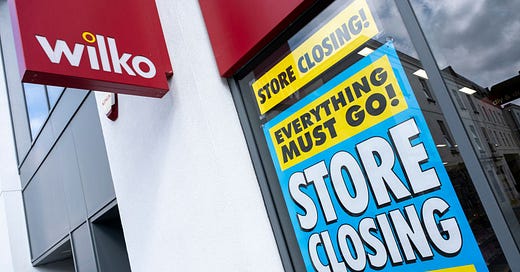Hello and welcome to the latest edition of Off to Lunch…
England and Wales are on track to record the highest number of corporate insolvencies in a year since 2009, according to new data published this morning.
There were 1,967 corporate insolvencies in September, 17 per cent more than the same month last year and 30 per cent higher than pre-Covid levels. However, the number of insolvencies in September is lower than the 2,308 recorded in August 2023.
The data from the Insolvency Service reflects the pressure on businesses from higher interest rates, which means they are paying higher interest rates on debt and their customers are being squeezed. But it also reflects the end of government support packages that helped businesses get through the Covid-19 crisis.
The table below shows how the number of insolvencies has risen…
You can find all the data from the Insolvency Service here
David Kelly, head of insolvency at PWC, the accountancy firm, said of the report:
“While this dip [from August] is welcome, we expect the respite to be short-lived, with the UK remaining on track for the highest number of insolvencies since 2009.
“The challenging economic climate continues to impact companies across a range of sectors. Construction is being particularly hard hit, suffering more insolvencies than any other sector, while retail and hospitality and leisure continue to struggle. Indeed, restaurant closures have sadly reached the highest level in a decade.”
The insolvency data highlights why the Bank of England is reluctant to push interest rates up further to fight inflation.
Andrew Bailey, governor of the Bank of England, has said this morning that future decisions on interest rates are likely to be “tight” and that the economic outlook for the UK is “very subdued”. Nonetheless, on a more positive note, he added:
“From an economic point of view, if we look back over the last year I would say I’m probably the one person that can come in here and say things really do look better today than they did on this day last year. I can say that with some confidence.”
Bailey was speaking at the International Monetary Fund’s annual meeting in Marrakesh, Morocco. The event last year was held in Washington in the aftermath of Liz Truss and Kwasi Kwarteng’s mini-Budget.
You can find more about Bailey’s comments via a Telegraph story here
Jamie Dimon, the chairman and chief executive of JP Morgan, the biggest bank in the world by market capitalisation, has also made some interesting comments about the economic outlook today. In a statement issued as part of JP Morgan’s latest quarterly results, Dimon said:
“The war in Ukraine compounded by last week’s attacks on Israel may have far-reaching impacts on energy and food markets, global trade, and geopolitical relationships. This may be the most dangerous time the world has seen in decades. While we hope for the best, we prepare the firm for a broad range of outcomes so we can consistently deliver for clients no matter the environment.”
You can find JP Morgan’s results here
Other stories that matter…
1. The Competition and Markets Authority has approved Microsoft’s $69 billion takeover (£56 billion) of video game maker Activision Blizzard after initially blocking the deal. The CMA said it had secured a concession that is “a gamechanger that will promote competition”. That concession is Activision selling the rights to stream its games online to Ubisoft instead of Microsoft. Piece here
2. PureGym, the gym operator, has completed an £805 million refinancing, replacing old bonds with new ones and a bank facility. The company has secured the refinancing this week despite the volatility in debt markets around the world, providing evidence that growing businesses are still able to secure funding. You can find the company’s statements on the refinancing here and our podcast interview from last year with PureGym chief executive Humphrey Cobbold here
3. The Oracle founder Larry Ellison is opening a research institute in Oxford with backing from Sir Tony Blair, the former prime minister. Blair said the project is “an enormous boost to the growth of the UK’s technology sector” and will “find and fund the best young minds from the UK and around the world”. You can read a story in The Times about this here
4. Local councillors in Newcastle are unhappy that Amazon has been allowed to advertise online shopping deals on a billboard located in the main shopping street in the city. Story here
5. We all hate email but businesses are yet to find a more efficient way to communicate, according to Tim Harford’s latest column for the Financial Times. You can read that piece here
And finally…
The David Beckham documentary on Netflix has something for everyone - 1990s nostalgia, celebrity, sport and a personal story with highs and lows. I have lost count of the number of people who have recommended Beckham to me and said how much they enjoyed it, many of whom have no interest in sport. You can watch Beckham on Netflix here
Thanks for reading. If you enjoy Off to Lunch then please share it with others and spread the word. If this newsletter was shared with you then please sign-up below to become a member, get Off to Lunch sent directly to your inbox, and contribute to the work of Off to Lunch
Best
Graham






